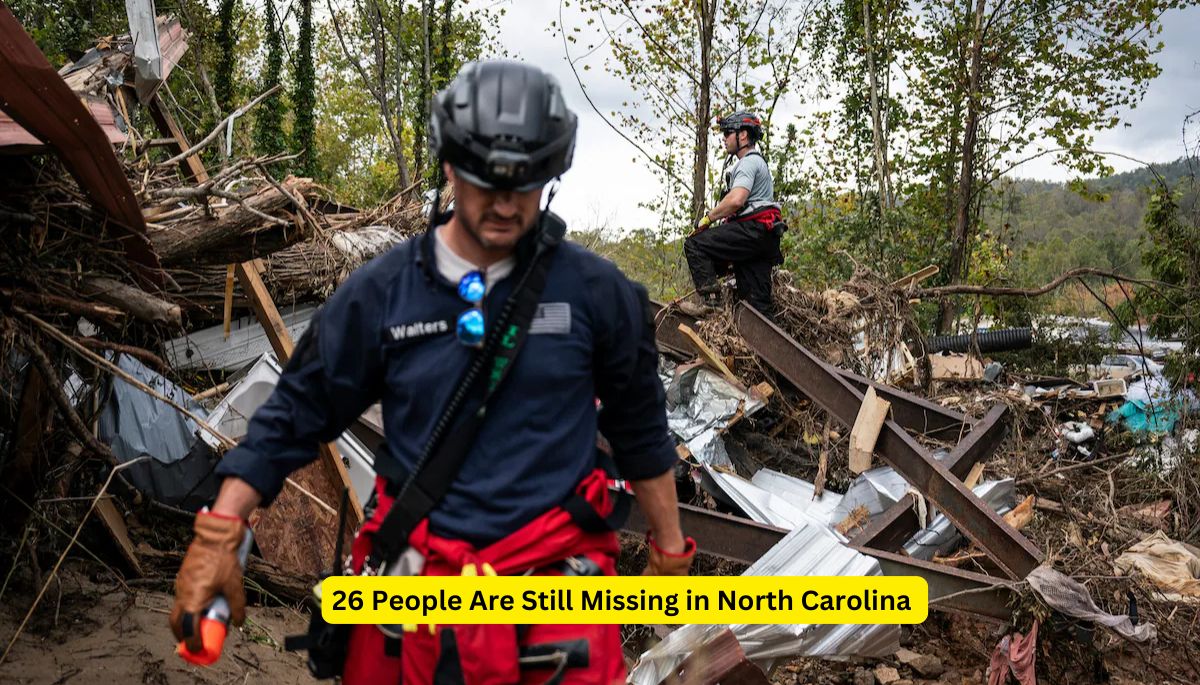The aftermath of Hurricane Helene has left devastating impacts on North Carolina, with 26 people still missing in the state. As rescue teams work tirelessly, families across the region are left anxious, awaiting news of their loved ones. The hurricane brought intense rainfall, flooding, and strong winds, which wreaked havoc on communities, displaced residents, and caused extensive damage to infrastructure.
This article will take you through the latest information on the ongoing rescue efforts in North Carolina, the challenges faced by search teams, and the steps being taken to prevent similar losses in future weather events.
Lost People
The Power of Hurricane Helene
Hurricane Helene hit North Carolina with massive force, leading to flooding and widespread destruction across several counties. With wind speeds surpassing 120 mph, the hurricane’s intensity shattered homes, cut off roads, and left thousands stranded. The scale of this destruction made it particularly difficult for first responders to reach those in remote or isolated areas, many of whom are now among the 26 missing individuals.
Why Are So Many People Still Missing?
As the storm intensified, floodwaters surged and swept away vehicles, properties, and unfortunately, people. The heavy rains flooded rivers and caused dangerous flash flooding in low-lying areas, where entire communities were cut off from help. Many of the missing people were reportedly last seen in regions where floodwaters rose rapidly, making rescue operations challenging.
Several of those missing were last known to be in vulnerable areas, such as riversides or flood-prone zones, and lost contact as evacuation routes became impassable. The combination of disrupted communication lines, fallen trees, and washed-out roads hindered timely evacuation and assistance.
Ongoing Search and Rescue Operations
North Carolina’s emergency response teams, local law enforcement, and the Federal Emergency Management Agency (FEMA) are leading the search and rescue operations. Specialized search units, including K9 teams and divers, are deployed to comb through flooded areas and assess places where the missing were last located. Helicopters, drones, and boats are also being utilized to cover vast flooded regions, particularly in areas that remain difficult to access by ground.
The focus is on finding any trace of the missing individuals, and rescue teams are working around the clock to bring closure to families awaiting news.

Challenges in the Rescue Efforts
The search operations are facing several obstacles:
- High water levels: Even days after the storm, floodwaters in certain areas remain at dangerous levels, complicating rescue efforts.
- Blocked roads: Downed trees and debris are still blocking numerous roads, preventing search teams from reaching some affected regions.
- Lack of communication: With communication lines down in many rural areas, coordinating efforts with the public has proven challenging.
- Fatigue of responders: Rescue teams have been working for extended hours in dangerous conditions, battling exhaustion to reach everyone.
The Community’s Role in Search Efforts
North Carolina’s communities have been instrumental in supporting search efforts. Volunteers from various organizations, churches, and local groups have joined forces, providing manpower and resources. Local businesses have donated equipment and supplies, while residents have come together to assist authorities by sharing critical information about the missing individuals’ last-known locations.
Community members continue to offer shelter, food, and other resources to those who have been displaced, creating a strong network of support in this challenging time.
Support for Affected Families
The families of the missing individuals are experiencing immense distress. Local mental health organizations, community groups, and crisis response units are offering counseling and support services to those impacted. Authorities have set up dedicated hotlines for families to receive updates and check the status of their loved ones. Some organizations have even provided temporary housing and financial assistance to those who have lost homes or essential possessions.
The Long-Term Impact on North Carolina
The physical destruction from Hurricane Helene will take years to repair. Infrastructure such as bridges, roads, power lines, and homes will require extensive rebuilding. The emotional toll on communities, however, will be felt for much longer. Those who have lost family members, homes, and livelihoods face an uphill battle as they work to rebuild their lives.
The economic impact of the hurricane is expected to be significant. With damage to both residential areas and key industries, including agriculture and manufacturing, North Carolina is likely to see long-term financial effects that will require substantial investment and state support.
Preventive Measures Against Future Hurricanes
In light of this disaster, North Carolina is prioritizing ways to better prepare for future hurricanes. New initiatives under discussion include:
- Upgrading infrastructure: Improving the resilience of roads, bridges, and buildings to withstand extreme weather conditions.
- Strengthening evacuation routes: Ensuring that escape routes are accessible, even during heavy rains and high winds.
- Community awareness programs: Educating the public about hurricane preparedness and the importance of evacuating when advised by officials.
- Enhanced early-warning systems: Developing more advanced weather tracking and alert systems to give residents and authorities more time to act.
Environmental Factors and Extreme Weather
Climate change has played a role in the increasing frequency and severity of hurricanes. Warmer ocean temperatures and altered atmospheric conditions contribute to more powerful storms. With North Carolina’s coastal location, the state is particularly vulnerable to hurricanes and is likely to experience similar events in the future.
Environmental experts are advocating for comprehensive climate adaptation plans, including conservation efforts that strengthen natural defenses such as wetlands, which can reduce the impact of floods.
How Can You Help?
If you want to help the ongoing recovery and rescue efforts in North Carolina, here are some ways to contribute:
- Donate to local charities and organizations providing support to affected families.
- Volunteer with recognized groups involved in relief efforts.
- Spread awareness on social media to encourage others to support the cause.
- Stay informed about the status of recovery efforts and any additional needs that arise.
Many organizations, including The American Red Cross and local shelters, are accepting donations for the victims, and every contribution can make a significant impact.
Moving Forward: Hope Amidst the Tragedy
Despite the devastation, there is hope. The resilience of the people of North Carolina and the unwavering support from communities across the nation showcase the power of unity and compassion in difficult times. The search and rescue operations continue with full force, and the community remains committed to supporting the families of the 26 missing individuals. While rebuilding may take time, North Carolina’s strength and determination offer a powerful reminder of the enduring human spirit.
Conclusion
The story of the 26 missing people in North Carolina following Hurricane Helene highlights the devastating impact of natural disasters on individuals and communities. The ongoing search efforts, community support, and resilience of those affected reflect a collective commitment to recovery and hope. As North Carolina moves forward, the experiences from Hurricane Helene underscore the importance of preparedness, resilience, and support systems in the face of future storms. The memory of those lost and missing remains at the heart of North Carolina’s path to healing and rebuilding.
